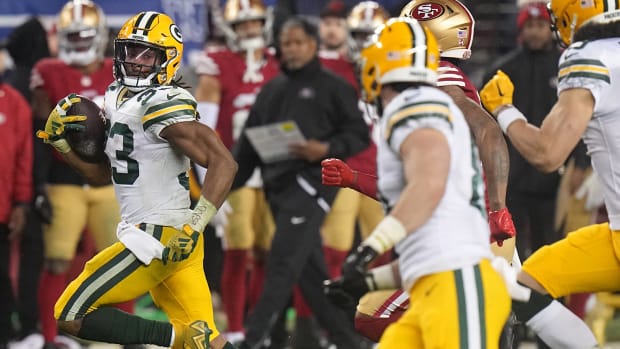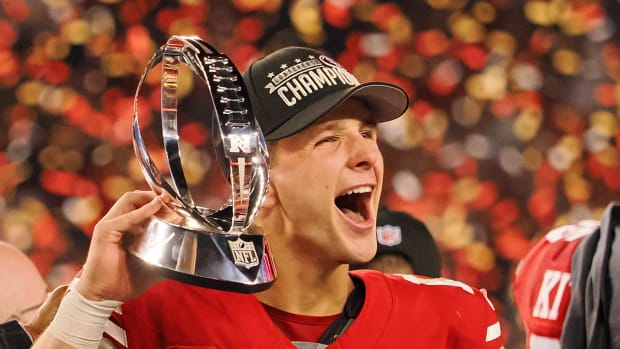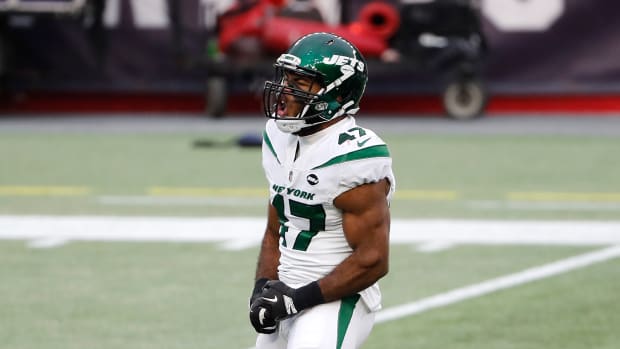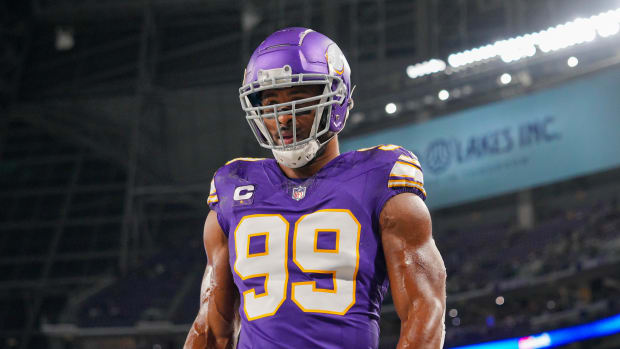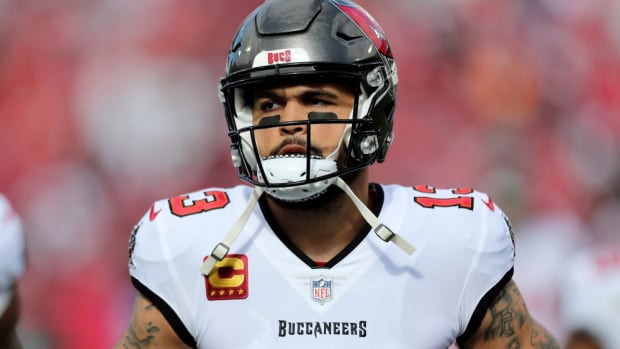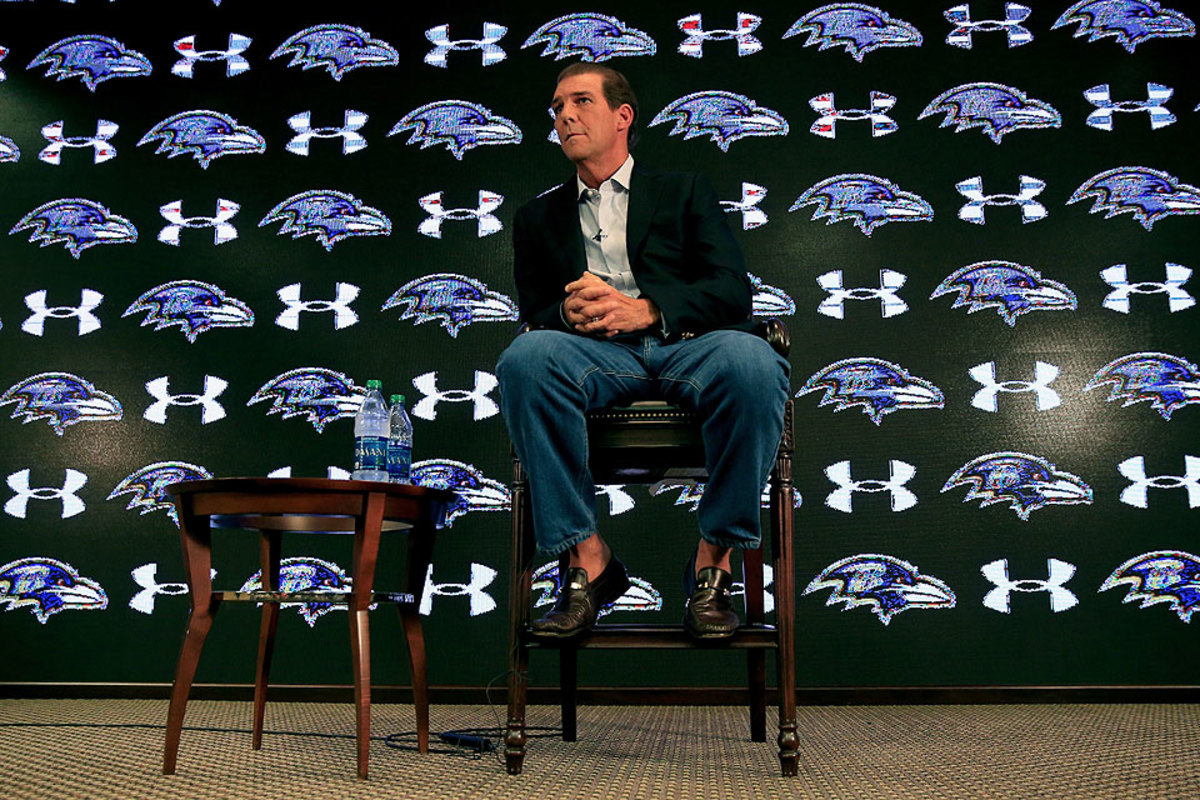
The Week 3 Mailbag
I want to lead the Mailbag this week with a quick comment on Ravens owner Steve Bisciotti’s news conference Monday afternoon, where he addressed the thoroughly reported ESPN story that questioned his organization’s response to the Ray Rice crisis.
The most interesting thing that I thought Bisciotti said was this: "What we're seeing is that the league never elevated domestic violence to the platform it should have been on." I thought that was perfect. Over the past few years, the league has become so focused on things like marijuana arrests and players acting up in bars that league executives have ignored creating a realistic policy on domestic violence. I’m sure every owner in the league watching Bisciotti speak on Monday afternoon was in agreement that the NFL has been far too late in addressing this issue constructively. So that was a good takeaway from Bisciotti’s remarks, and it leads us to what should happen this week.
I suspect commissioner Roger Goodell and his NFL Players Association counterpart De Smith to meet as early as Tuesday to begin to form a committee to revamp the Personal Conduct Policy in the NFL as part of a collaborative effort between the two sides. This is a very important moment for the league, which has to play catch-up on personal conduct, but particularly on domestic violence. No one disputes that and now it’s incumbent on the league to make it happen, and quickly.
Now for your emails:
WHAT'S WRONG WITH TRENT? If Trent Richardson hadn’t been drafted third overall in the 2012 draft and then been traded for a first-round pick, would he still be on an NFL roster, never mind start for a playoff contender? What value does he bring to an NFL team?
—Larry, London, Ontario
In three seasons, Trent Richardson's yards per carry is 3.4 and he's averaging less than 50 yards per game. (Rob Foldy/Getty Images)
Richardson’s biggest problem when I watch him play is his inability to make people miss. It’s interesting when you see very good college running backs come into the NFL. Take Le’Veon Bell, for instance. He was not a very good all-around back last year in Pittsburgh. His blocking was suspect. I don’t think he had the requisite toughness that Mike Tomlin requires in his back. But he worked hard this offseason and got better at the deficient parts of his game. As far as Richardson goes, I don’t know if it’s possible to increase one’s quickness or shiftiness appreciably in an offseason. But that is what Richardson must do to improve his running ability and his chances of salvaging a once-promising career.
ON OFFICIATING. Watching the Cardinals-49ers game got me thinking: the game has become so fast, and the difference between legal and illegal hits so gray, is it even reasonable for us, the fans, to expect competent officiating?
—Andrew, Menlo Park, Calif.
I think you should expect competent officiating, but not consistently superior officiating. The game is too fast. Officials cannot reliably see hits that on replay appear to be so obviously, say, a helmet-to-helmet hit, but upon further review are not. That’s the reason why I favor instant replay for every play. I don’t favor any additional replay opportunities beyond the current rule. But if a coach feels he has just seen a horrible call and wants to have it reviewed, he should have the right to do so. Once he has used his allotment for the game, then he can’t review calls later in the game. That’s the only way that I can see a safeguard for an obviously wrong call involving these lightning-fast plays that are very hard for the human eye to get right consistently.
• PETER KING: 'The NFL Needed This' || Peyton Manning, Unplugged || Complete Archive
NFL, UNION FAILED THE TEST. I have issues with your statement, "It shouldn’t have taken 38 months to get HGH testing in the NFL; that’s obvious," because it isn't obvious. In 2011 Andrus Veerpalu, an Olympic gold medal-winning Estonian cross country skier tested positive for HGH. In 2013, upon appeal, he was cleared after the test was deemed "unreliable." The decision limits of that test have been tweaked since then; however, that case played out in the 38 months where you feel the NFL should've been testing for HGH. If that's the test the NFL wants to use and even if the test were unreliable, I wouldn't be surprised if the NFL upheld suspensions based on the test results, because after all, there was no third party overseeing the appeal process. The NFLPA was wise to resist testing, especially when the test itself is questionable. This situation brings to mind athletes with high hemoglobin. Often it's due to athlete seeking an advantage but sometimes it's simply due to genetics, as in the case of Eero Mäntyranta. If the test can't distinguish between the two (as it appears to be the current case with HGH), the test shouldn't be used.
—Ian, Bel Air, Md.
Talk Back
Got a question for Peter King? Submit it, along with your name and hometown, to talkback@themmqb.com and it might be included in next Tuesday’s mailbag.
Thanks for writing a very intelligent letter. I appreciate your points. And I agree with every one of them, except for one. The last three seasons in the NFL have been played with players knowing that they can get away with using HGH. We would both have to be incredibly naïve to think that a number of them—I have no idea if it’s 5 or 155—were using HGH to gain a competitive advantage. In other words, I believe there has been cheating on some scale over the last three years involving HGH. You were right—there wasn’t a foolproof system. But the Olympics over the last three years, and international track and field over the last three years, have had testing for it. I think that the NFL and the NFLPA should have been able to work out some way to have testing. I understand that testing might not have been perfect, and I am respectful of the human rights aspect of this. I just think that the two sides should have found some middle ground to get this done before last week.
SOMETHING TO CHEW ON. With Major League Baseball going to lengths over the last several years to stop players and coaches from carrying chew tins onto the field and banning chewing tobacco in Minor League Baseball, why has the NFL not followed suit? On any given NFL telecast, the camera pans to many coaches/executives with either that familiar circle in their back pocket or a big dip sitting in their lower lip.
I know that when I attend an NFL game, my ticket specifically says “no tobacco products allowed,” yet there is team executive X sitting in the press box spitting into an empty cup being broadcast nationwide.
Maybe the NFL cares, maybe they don’t. It just seems strange that it has become such a major issue in baseball yet goes ignored in professional football.
—Adam, Grande Prairie, Alberta
I’m going to ask that question this week. I must say that I don’t see it all that often in the NFL on game days. But I certainly see it a lot, for instance, in training camp when coaches and players don’t try to hide it. I appreciate you bringing it up.


































